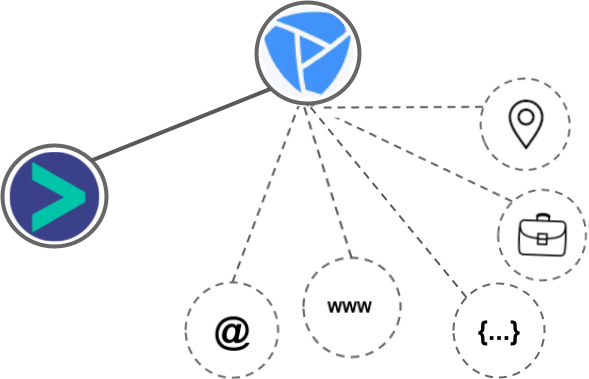Platformly vs Salesforce
Hyperise integrates with 100's of sales and marketing tools, many of which are in the CRM category. With so many to choose from it's sometimes hard to know which is best, but don't worry, we've got your covered.
In this comparison guide we're going to look at the Highlights, Pros, Cons and Pricing of Platformly and Salesforce. We'll also delve into the details of which offers the best personalization options within CRM, with there respective Hyperise integrations

Platformly
Pricing: Platformly pricing is based on the size of your list, and you can get started for as low as $14/month. The more contacts you have, the more you will pay; however an additional 10% discounts is applied when customers commit to an annual plan. Additional features and services can be purchased as add-ons.
Vs
Salesforce
Pricing: Salesforce uses a subscription-based pricing model, with four main plans ranging in cost from $25 per user per month for their Essential plan to $300+ per user per month for their Unlimited plan. All plans allow customers to customize the features they use according to their business needs. There is also an Enterprise plan that must be negotiated with Salesforce on an individual basis.
Platformly vs Salesforce Highlights
Platformly is a cloud-based Customer Relationship Management (CRM) platform designed to help businesses bond with potential and existing customers. It is known for its intuitive user interface and accessible and easy-to-understand service. Unlike Salesforce, Platformly is designed specifically for small businesses and entrepreneurs, providing them with access to the same kinds of powerful tools and feature sets that large organizations and corporations have access to. Platformly also offers a wide range of features for marketing automation and communication that are not available in Salesforce, such as email and web forms, automatic tagging and segmentation of contacts, custom automated campaigns, plus comprehensive tracking and analytics tools. In addition, Platformly provides much more user-friendly navigation, making it easier for users to find what they need quickly and efficiently. It also allows users to control their access privilege settings, giving users the ability to manage who has access to what data. Finally, Platformly is more affordable than Salesforce, providing all the features and functions organizations need at a much lower monthly cost.
Platformly vs Salesforce Pros
Platformly Pros
- Intuitive and easy to use design which eliminates the need for training
- Low cost option compared to expensive Salesforce solutions
- Flexible automation with advanced segmentation capabilities
- Relationship-level tracking of customers so you can always keep tabs on who does what
- CRM, Email marketing, and automation integrations available for all-in-one customer experience and workflow automation
- Zapier integration to easily sync data with other software or websites
- Push notifications within Dashboard to stay connected and alerted
- Robust reporting and analytics capabilities to measure customer engagement
- Drag & Drop builder for creating and organizing emails quickly and easily
- Automation Rules that quickly adjust campaigns/actions based on customers' behavior
Salesforce Pros
- Pros of Salesforce compared to Platformly:
- Salesforce offers a more comprehensive suite of products, including marketing automation, customer relationship management (CRM), and analytics tools.
- Salesforce is one of the most secure cloud platforms, and provides enterprise-grade security and privacy features, as well as compliance with major industry standards.
- Salesforce offers advanced customization options, allowing you to tailor the platform to meet your specific needs.
- Salesforce has a large partner ecosystem, and provides access to thousands of third-party apps, integrations, and add-ons.
- Salesforce provides robust and detailed analytics capabilities, giving you the ability to monitor and analyze your customer interactions in real time.
Platformly vs Salesforce Cons
Platformly Cons
- Platformly does not have an integrated customer relationship management (CRM) system like Salesforce
- Platformly does not have as wide a range of customer service and technical support options as Salesforce
- Platformly does not offer native mobile app support, while Salesforce does
- Platformly has highly limited third-party integration options compared to Salesforce
- Platformly has fewer analytics and reporting features when compared to Salesforce
Salesforce Cons
- Salesforce can be expensive to use due to its subscription and licensing costs.
- Salesforce does not have a wide range of features compared to Platformly.
- Salesforce does not offer email marketing automation or segmentation capabilities.
- Salesforce does not have the same level of customization capabilities as Platformly.
- Salesforce does not offer any native integrations to other platforms or services.
- Salesforce requires an additional fee for certain features, such as analytics and reporting.
Platformly & Salesforce Hyperise Integrations
Platformly uses the HTML code embed method to integrate with Hyperise, giving a simple way to add personalized images to your messages.
Platformly makes the following data points available to Hyperise, to enable personalization in images used in outreach and linked out to your personalized website landing pages.

- Using business Email passed from Platformly, Hyperise is able to enrich business logo and website screenshots. In some cases, with a business Email we're also able to enrich profile images, subject to the business email having a publicly available profile.
- Using business Website passed from Platformly, Hyperise is able to enrich business logo and website screenshots.
- Business name
- City
- Country
- Zip
Platformly Integration Guide
Salesforce uses the HTML code embed method to integrate with Hyperise, giving a simple way to add personalized images to your messages.
Salesforce makes the following data points available to Hyperise, to enable personalization in images used in outreach and linked out to your personalized website landing pages.
- Using business Email passed from Salesforce, Hyperise is able to enrich business logo and website screenshots. In some cases, with a business Email we're also able to enrich profile images, subject to the business email having a publicly available profile.
- Using business Website passed from Salesforce, Hyperise is able to enrich business logo and website screenshots.
- Business name
- City
- State
- Country
- Zip
- Category
Salesforce Integration Guide
 vs
vs  vs
vs  vs
vs  vs
vs  vs
vs  vs
vs  vs
vs  vs
vs  vs
vs 
 vs
vs  vs
vs  vs
vs  vs
vs 













 vs
vs  vs
vs  vs
vs 




